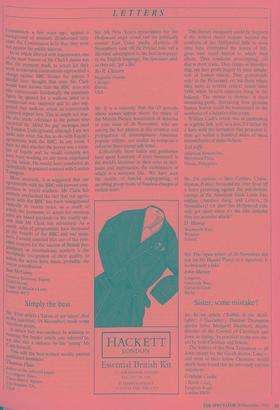Inequitable
Sir: The central assertion in Ross Clark's article (`No militants like showbiz !Dili' tants', 26 November) that Equity has a closed-shop agreement with the BBC iS preposterous. As a union of performers we are hot unused to intemperate and inaccurate attacks upon us, but for Mr Clark to assert that the British Broadcasting Corporation has concluded and is operating an agre- ment with us which falls outside the law is breaking new ground and has to be refuted' Had Mr Clark properly researched his facts, it would have been abundantly dear to him and to your readers that: Even before recent trade union legisla- tion the BBC was prevented under the terms of its Charter from entering int° closed-shop agreements with any trade union.
All of Equity's agreements with employ and trade associations comply fully with etit- rent legislation — and always have done. r, When Equity's agreements with the 1313' and the other employers in television vver! examined by the Monopolies and Merger'
LETTERS
Commission a few years ago, against a background of similarly ill-informed criti- cism, the Commission held that they were not against the public interest. In an article littered with inaccuracies, one of the most bizarre of Mr Clark's claims was that the payment made to actors for their work in television commercials represented a charge against BBC licence fee payers. I Should have thought that even Mr Clark would have known that the BBC does not take commercials. Incidentally, the minimum figure he quoted for a walk-on artist in a commercial was incorrect and he also sug- gested that walk-on artists in commercials received repeat fees. This is simply not true. He also made reference to the person who recorded the 'Mind the gap' messages used by London Underground, although I am not quite sure what this has to do with Equity's agreements with the BBC. In any event, I have no idea whether the person was a mem- ber of Equity and he would certainly not have been working on any terms negotiated by the union. He would have concluded an individually negotiated contract with London Transport. More seriously, it is suggested that our agreements with the BBC will prevent com- petition in world markets. Mr Clark has entirely overlooked the fact that our agree- ment with the BBC has been renegotiated radically in recent years, as a result of Which the payments to actors for overseas sales are based precisely on the royalty sys- tem that Mr Clark has advocated. As a result, sales of programmes have increased to the benefit of the BBC and our mem- bers. I would contend that one of the prin- cipal reasons for the success of British pro- grammes in international markets is the worldwide recognition of their quality, to which the actors have made, probably, the major contribution. Ian McGany
General Secretary, Equity, Guild House, Upper St Martin's Lane, London WC2



































































 Previous page
Previous page